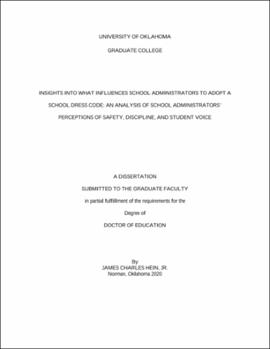| dc.description.abstract | Abstract
Research in the field of school dress codes has in general been centered around whether they improve the learning environment in areas of safety discipline and academic performance. Researchers have studied the perceptions of whether school administrators believe dress codes work. There are many studies that support both sides of the dress code debate (Yeung, 2009; Gilbert, 1999). At some point in time a school administrator must decide on whether to implement a dress code and how extensive the dress code must be. Because of this there are numerous studies which inquire about the administrators’ perceptions regarding dress codes.
This study investigated the difference of school administrators’ past experiences to increase the understanding of how the implementation of a dress code varies by their perceptions of safety, discipline, and student voice. The data were analyzed with the Analysis of Variance Model (ANOVA) and the Spearman Correlation. The findings from the ANOVA revealed: no significant difference in school administrators’ generational status and their perception that a dress code policy improves safety for Research Question 1 at F (2, 80.621) = 1.04, p = .36, no significant difference in school administrators’ generational status and their perception that a dress code policy improves discipline for Research Question 2 at F (2, 225) = 3.05, p = .05 (the p-value exceeds the Bonferroni Correction of .008), and no significant difference in school administrators’ generational status and their perception that student voice improves a dress code policy for Research Question 3 at F (2, 226) = 0.5, p = .61. The Spearman Correlation showed: a significant positive correlation between school administrators’ ratings of dress code policy improving safety and the values they learned growing up at r (238) = .39, p < .001 for Research Question 4, a significant positive correlation between school administrators’ ratings of dress code policy improving discipline and the values they learned growing up at r (220) = .44, p < .001 for Research Questions 5, and a nonsignificant, weak negative correlation between school administrators’ ratings of student voice participating in the development of a dress code policy and the values they learned growing up at r (227) = -.02, p = .78 for Research Question 6.
The findings from this nonexperimental research study suggest the Contextual Framework Model introduced in chapter 2 (see figure 1 in Chap. 2), has no predictability in Research Questions 1-2-3-6, whereas some explanatory power exist in Research Questions 4-5. This study was comparable to the research conducted by the U.S. Department of Education’s National Center for Education Statistics (NCES), which did not find dress codes improving safety or discipline in a public school (NCES 2018-036). The findings from this study suggest school administrators’ generational status does not play a significant factor in their perceptions of safety, discipline, or student voice improving a dress code policy. Likewise, this study demonstrates there is no difference between a school administrators’ perceptions of student voice participating in the development of a dress code policy and the values they learned growing up. Nevertheless, this study did find a statistically significant relationship between the values school administrators learn growing up and their perceptions of safety and discipline improving a dress code policy. | en_US |
